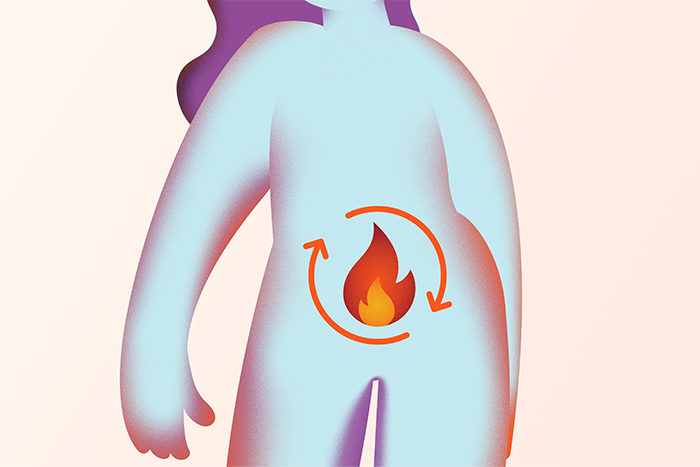How stress affects weight – why losing weight can be more difficult
Stress and weight loss are often connected. During prolonged stress, the body is affected by hormones such as cortisol and adrenaline, which can influence how the body uses energy, our appetite, and our eating habits. This can cause some people to lose weight, while others find it harder to lose weight – or even gain weight (1).

Stress in moderation
Stress is a natural bodily reaction that can help us perform a little better for short periods of time. It gives us focus and drive, helping us do what needs to be done. But when stress continues for too long and recovery is insufficient, it affects health, sleep, appetite, and energy levels. At that point, stress can lead to weight loss or make it difficult to maintain a stable weight.
Why we get stuck in stress
Negative stress is rarely caused by a single event but by an imbalance between demands and recovery. It often builds up slowly, through small excesses: taking on a bit too much, skipping breaks, sleeping a little less. Helpful thoughts like “I’ll just finish this one thing” can, over time, become traps that prevent the body from resting.
Stress can also be maintained by mental patterns, such as:
- Ruminating and worrying – thoughts that circle around what has already happened or what might happen.
- Perfectionism – an inner pressure to always perform at your best.
- Difficulty setting boundaries – often saying yes even when you are tired.
When these patterns persist over time, stress is no longer just a reaction to circumstances but a state that the body gets stuck in (2).
How stress affects behaviour and appetite
Stress influences the brain, the body, and our daily habits. When we are stressed, it becomes harder to maintain healthy routines: we move less, go to bed later, skip meals, or eat fast food on the go. At the same time, cravings for sweets and energy-dense foods increase. Stress can therefore cause us to eat faster and more than usual, and food choices become more driven by cravings than hunger – something that makes weight loss more difficult.
The biology behind it
There are biological explanations behind these behaviours. When the body experiences stress, the so-called HPA axis (the body’s stress system) is activated, leading to the release of the stress hormone cortisol. Cortisol helps us manage threats and strain in the short term, but prolonged stress disrupts the balance of the system.
For some people, this leads to reduced appetite – especially during acute stress – as the body prioritises handling the situation rather than taking in energy. However, during chronic or prolonged stress, the opposite often occurs. Cortisol affects the brain’s reward system, making us more receptive to foods high in quick carbohydrates and fat, which temporarily calm anxiety and create a sense of comfort.
Research shows that during long-term stress, high cortisol levels can lead to increased fat storage, particularly around the abdomen, which can in turn negatively affect metabolism and health (3).
Reviewing your life situation
To break a pattern of long-term stress and create room for recovery, you first need to review your current life situation. It may be necessary to identify what can actually be changed, simplified, or supported. This might mean asking for help, lowering demands, redistributing responsibilities, or making clear priorities. Sometimes small adjustments make a difference; other times, larger changes are needed.
Paths to recovery
Recovery is not just about rest – it’s about creating balance between activity and stillness. For the body and brain to recover, we need variation: periods of focus and effort followed by rest, movement, and social contact. It’s also important that leisure time is genuinely free from work and devoted to restorative activities.
Research shows that the benefits of a change of environment largely depend on whether we actually manage to disconnect from what causes stress, not just physically change location (4).
Strategies to reduce negative stress and promote recovery for body and mind
Physical strategies
- Regular sleep and meals: Go to bed and get up at roughly the same time every day, even at weekends. Eat at set, regular times.
- Movement: Physical activity lowers stress hormones and increases levels of serotonin and endorphins. It doesn’t have to be intense training – walking can go a long way.
- Breathing and relaxation: Deep breathing, yoga, and progressive muscle relaxation – where you consciously tense and release different muscle groups – activate the body’s rest-and-digest system.
Psychological strategies
- Set boundaries: Practise saying no or “not right now.”
- Schedule breaks: Short recovery periods during the day (for example, 5 minutes without screens) can make a big difference.
- Create distance from thoughts: Try to view worry thoughts as just that – thoughts, not facts. Tell yourself “I notice that I’m worrying about…” instead of “This will go wrong.”
- Focus on the present: When stress takes over, much of it revolves around the future or the past. Practise mindfulness in simple daily moments – when showering, doing the dishes, or taking a slow, conscious walk.
How stress makes weight loss more difficult
When we are stressed, it becomes harder to regulate our behaviour and stick to habits and routines, such as planned meals. Stress can also increase cravings for foods high in fat, sugar, and calories, which may offer short-term comfort but can negatively affect weight over time.
At the same time, stress causes the body to prepare to store more fat, especially around the abdomen, which can lead to a larger waist circumference and negatively impact health (3).
Many people also move less and sit more when they are stressed, which reduces energy expenditure. Stress also affects sleep, meaning we often sleep less and more poorly – something that, in turn, increases hunger and cravings for sweet and fatty foods.
Getting help with stress management
If stress has been ongoing for a long time, sleep is not improving despite efforts to change it, or if you feel tired, drained, or low in mood, you should seek help. Long-term stress can affect both the body and overall health, but effective treatment is available.
Healthcare services can provide support to help you manage stress, improve sleep, and reduce anxiety or low mood so that your body can recover.
Summary
Stress and weight are often linked. During long-term stress, the body is affected by hormones such as cortisol and adrenaline, which can alter appetite, energy expenditure, and fat storage. For some, this means losing weight, while for others it becomes harder to lose weight or they gain weight instead.
Short-term stress is normal and can help us perform a bit better, but without recovery it can become harmful. Negative stress often builds up gradually – we sleep worse, skip breaks, move less, and eat irregularly. At the same time, cravings for fatty and sugary foods increase, which can further influence weight.
During long-term stress, cortisol is released, causing the body to store more fat around the abdomen and disrupting hormones that regulate hunger and satiety. Poor sleep, inactivity, and worry also make it harder to maintain a stable weight.
To break stress patterns, you need to create space for recovery. Regular sleep, physical activity, balanced eating habits, and short breaks throughout the day help the body regain balance. Setting boundaries, lowering demands, and practising mindfulness can be important steps.
If stress has been ongoing for a long time, or if you feel tired, low, or have trouble sleeping, it’s important to seek help. Effective treatment is available to help you manage stress and improve your overall health.
References
- Tomiyama, A.J., 2019. Stress and obesity. Annual Review of Psychology, 70, pp.703–718. doi:10.1146/annurev-psych-010418-102936
- Brosschot, J. F., Verkuil, B., & Thayer, J. F. (2018). The default response to uncertainty and the importance of perceived safety in anxiety and stress: An evolution-theoretical perspective. Journal of Anxiety Disorders, 55, 49–55.
- Luna-Luna, M., Hernández-Saavedra, D., Sandoval-Jurado, L., Ortiz-Rodriguez, M.A., Medina-Urrutia, A., Vargas-Alarcón, G. & Fragoso, J.M., 2020. Chronic stress, epigenetics, and adipose tissue metabolism in the obese state. Nutrition & Metabolism, 17(1), p.95.
- Sonnentag, S. & Fritz, C. (2015). Recovery from job stress: The stressor–detachment model as an integrative framework. Journal of Organizational Behavior, 36(S1), S72–S103.

November 6, 2025
November 28, 2025
Start your weight loss journey with Yazen today
Everything you need to do is to create an account and answer some questions about your health
.svg)
.svg)
More articles
Boost your metabolism – how it works and how you can influence it
Every second, your body uses energy. Your brain needs fuel to think, your heart to keep beating, and your lungs to fill with air. Even when you are lying still, your body is constantly working in the background. All of this requires fuel. Metabolism, also known as metabolic rate, is the process by which the body converts food into energy.
Talking About Weight Loss With a Loved One
Conversations about weight with loved ones can be sensitive because they often carry stigma and personal emotions, making even well-intended concern feel like judgment. When approached with empathy, however, these talks can strengthen trust and encourage healthier habits.




.svg)

















